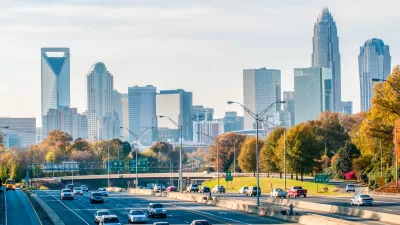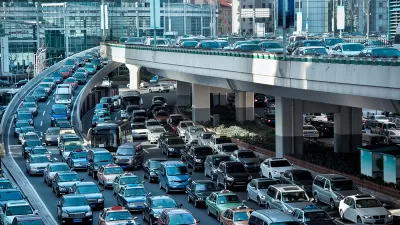The unpredictability of constantly changing commuting trends has some workers seeing much longer commute times as transportation agencies work to adjust to new travel patterns.

Despite expectations that the rise of remote work would shorten commutes—and data from the Census Bureau showing that to be, on average, true—“Experts say they are seeing traffic turmoil in many U.S. metropolitan areas, particularly those with government, tech and other jobs that lend themselves to hybrid schedules.”
As Katherine Shaver reports in the Washington Post, “Commutes now concentrated into a few days a week are causing noticeable swings in daily traffic volumes — motorists say Wednesdays are the worst — while greater flexibility in when to leave home has changed the timing of the morning rush.” According to Shaver, “Traffic at the height of rush hour feels as bad as ever in the Washington region and other large metro areas, experts say, because even a small increase tips a heavily saturated road network from free-flowing to stop-and-go.” The morning rush has been more affected by the pandemic than the evening rush hour, when more people run personal errands.
In Montgomery County, the traffic management system has been adjusting the timing of traffic lights to adapt to changing commute patterns, and Washington, D.C.’s Department of Transportation is working on an analysis of whether similar adjustments are necessary in the District. The region’s rail system, Metrorail, hit its highest ridership numbers since the pandemic began last Wednesday, but is still at only 44 percent of pre-pandemic trips.
FULL STORY: Why hybrid work schedules have made some commutes worse

Alabama: Trump Terminates Settlements for Black Communities Harmed By Raw Sewage
Trump deemed the landmark civil rights agreement “illegal DEI and environmental justice policy.”

Planetizen Federal Action Tracker
A weekly monitor of how Trump’s orders and actions are impacting planners and planning in America.

The 120 Year Old Tiny Home Villages That Sheltered San Francisco’s Earthquake Refugees
More than a century ago, San Francisco mobilized to house thousands of residents displaced by the 1906 earthquake. Could their strategy offer a model for the present?

LA’s Tree Emergency Goes Beyond Vandalism
After a vandal destroyed dozens of downtown LA trees, Mayor Karen Bass vowed to replace them. Days later, she slashed the city’s tree budget.

Sacramento Leads Nation With Bus-Mounted Bike Lane Enforcement Cameras
The city is the first to use its bus-mounted traffic enforcement system to cite drivers who park or drive in bike lanes.

Seattle Voters Approve Social Housing Referendum
Voters approved a corporate tax to fund the city’s housing authority despite an opposition campaign funded by Amazon and Microsoft.
Urban Design for Planners 1: Software Tools
This six-course series explores essential urban design concepts using open source software and equips planners with the tools they need to participate fully in the urban design process.
Planning for Universal Design
Learn the tools for implementing Universal Design in planning regulations.
Ada County Highway District
Clanton & Associates, Inc.
Jessamine County Fiscal Court
Institute for Housing and Urban Development Studies (IHS)
City of Grandview
Harvard GSD Executive Education
Toledo-Lucas County Plan Commissions
Salt Lake City
NYU Wagner Graduate School of Public Service





























